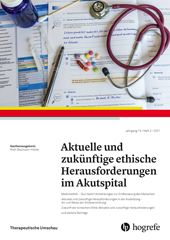Aktuelle und zukünftige Herausforderungen in der Intensivmedizin im Akutspital
Abstract
Zusammenfassung. Die aktuellen und zukünftigen (ethischen) Herausforderungen in der Intensivmedizin werden stark durch die aktuellen Entwicklungen in der Demographie und in der digitalen Welt beeinflusst. Ersteres wird Herausforderungen verschärfen, die bereits heute bestehen. Die digitale Transformation wird zur wahrscheinlich fundamentalsten Veränderung führen, die die moderne Medizin je gesehen hat. Nebst der personalisierten Medizin wird das Medizinalpersonal gefordert, sich über das Wissen und Können hinaus wieder vermehrt mit der Medizin als Kunst zu befassen und der Interaktion mit dem Patienten bzw. auch seinen Angehörigen ein hohes Gewicht beizumessen.
Abstract. Actual and future challenges in critical care medicine among others include changes in the demographic structure of Western societies leading to a growing number of aged and very old patients to be treated in the intensive care unit. Although age per se is not a good predictor for ICU survival it frequently comes along with several comorbidities influencing not only ICU but also one to five year survival as well as quality of life compared to a matched non-post-ICU population. Therefore, risk stratification among others seeking for signs of frailty in addition to the development of instruments in order to estimate the post-ICU quality of life are important in order to perform a sound risk-benefit analysis. For patients at risk scheduled for a major intervention pre-interventional interdisciplinary case analysis and discussion including patient and next of kin is warranted. Moreover, aged patients are at risk for under and overtreatment why clear written strategies adapted to the individual case have to be established. With regard to the development of more and more advanced treatment options in patients who finally cannot be cured a change of paradigm concerning palliative care is urgently needed. In these situations palliative care should not be seen as treatment option in the last days only but as accompanying support as soon as it is recognized that cure is not possible. This allows the patient to discuss and establish an advanced care planning together with the care givers. Major challenges in the very near future result from advances in personalized medicine (including genetic analysis) and from digital transformations of our societies. Both are closely connected and will change modern medicine within the next 15 years entirely. Expert systems with artificial intelligence and robots will support but also confront health care professionals with their limitations and hopefully remind them that medicine is not only science but also art and that the digital world at least for a while cannot provide clinical judgment, empathy and humanity as good as human beings.



